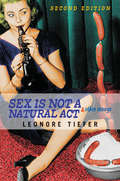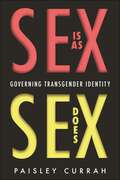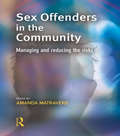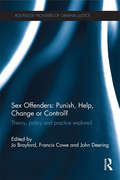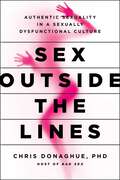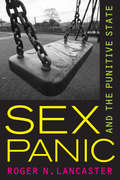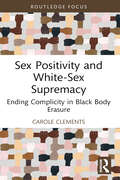- Table View
- List View
Sex Integration in Sport and Physical Culture: Promises and Pitfalls (Sport in the Global Society – Contemporary Perspectives)
by Alex Channon Robert J. Lake Thomas Fletcher Katherine DashperScholars working in the academic field of sport studies have long debated the relationship between sport and gender. Modern sport forms, along with many related activities, have been shown to have historically supported ideals of male superiority, by largely excluding women and/or celebrating only men’s athletic achievements. While the growth of women’s sport throughout the 20th and 21st centuries has extinguished the notion of female frailty, revealing that women can embody athletic qualities previously thought exclusive to men, the continuation of sex segregation in many settings has left something of a discursive ‘back door’ through which ideals of male athletic superiority can escape unscathed, retaining their influence over wider cultural belief systems. However, sex-integrated sport potentially offers a radical departure from such beliefs, as it challenges us to reject assumptions of male superiority, entertaining very different visions of sex difference and gender relations to those typically constructed through traditional models of physical culture. This comprehensive collection offers a diverse range of international case studies that reaffirm the contemporary relevance of sex integration debates, and also articulate the possibility of sport acting as a legitimate space for political struggle, resistance and change.This book was originally published as a special issue of Sport in Society.
Sex Is Not A Natural Act & Other Essays: And Other Essays (Psychology, Gender, And Theory Ser.)
by Leonore TieferRevisits and updates the centrality of the social construction of sexuality, especially in the age of Viagra, FSD (female sexual dysfunction) and the media saturation of sex. Leonore Tiefer is one of the foremost sexologists working in the United States today; she is a well-known and respected scholar who writes engagingly and humorously about a wide array of topics in sexuality to appeal to both students and general readers. Revised and updated with new pieces on the medicalization of sex, FSD (female sexual dysfunction) and the politics of sex, as well as classic pieces found in the original edition, such as "Am I Normal?: The Question of Sex."
Sex Is as Sex Does: Governing Transgender Identity
by Paisley CurrahWinner, Sexuality and Politics Book Award - American Political Science AssociationFinalist, PROSE Award - Government and PoliticsWhat the evolving fight for transgender rights reveals about government power, regulations, and the lawEvery government agency in the United States, from Homeland Security to Departments of Motor Vehicles, has the authority to make its own rules for sex classification. Many transgender people find themselves in the bizarre situation of having different sex classifications on different documents. Whether you can change your legal sex to “F” or “M” (or more recently “X”) depends on what state you live in, what jurisdiction you were born in, and what government agency you’re dealing with. In Sex Is as Sex Does, noted transgender advocate and scholar Paisley Currah explores this deeply flawed system, showing why it fails transgender and non-binary people. Providing examples from different states, government agencies, and court cases, Currah explains how transgender people struggle to navigate this confusing and contradictory web of legal rules, definitions, and classifications. Unlike most gender scholars, who are concerned with what the concepts of sex and gender really mean, Currah is more interested in what the category of “sex” does for governments. What does “sex” do on our driver’s licenses, in how we play sports, in how we access health care, or in the bathroom we use? Why do prisons have very different rules than social service agencies? Why is there such resistance to people changing their sex designation? Or to dropping it from identity documents altogether? In this thought-provoking and original volume, Sex Is as Sex Does reveals the hidden logics that have governed sex classification policies in the United States and shows what the regulation of transgender identity can tell us about society’s approach to sex and gender writ large.Ultimately, Currah demonstrates that, because the difficulties transgender people face are not just the result of transphobia but also stem from larger injustices, an identity-based transgender rights movement will not, by itself, be up to the task of resolving them.
Sex Itself: The Search for Male and Female in the Human Genome
by Sarah S. RichardsonHuman genomes are 99. 9 percent identicalOCowith one prominent exception. Instead of a matching pair of X chromosomes, men carry a single X, coupled with a tiny chromosome called the Y. aTracking the emergence of a new and distinctive way of thinking about sex represented by the unalterable, simple, and visually compelling binary of the X and Y chromosomes, "Sex Itself" examines the interaction between cultural gender norms and genetic theories of sex from the beginning of the twentieth century to the present, postgenomic age. aaaaaaaaaaaUsing methods from history, philosophy, and gender studies of science, Sarah S. Richardson uncovers how gender has helped to shape the research practices, questions asked, theories and models, and descriptive language used in sex chromosome research. From the earliest theories of chromosomal sex determination, to the mid-century hypothesis of the aggressive XYY supermale, to the debate about Y chromosome degeneration, to the recent claim that male and female genomes are more different than those of humans and chimpanzees, Richardson shows how cultural gender conceptions influence the genetic science of sex. aaaaaaaaaaaaRichardson shows how sexual science of the past continues to resonate, in ways both subtle and explicit, in contemporary research on the genetics of sex and gender. With the completion of the Human Genome Project, genes and chromosomes are moving to the center of the biology of sex. "Sex Itself" offers a compelling argument for the importance of ongoing critical dialogue on how cultural conceptions of gender operate within the science of sex. "
Sex Lives: Intimate Infrastructures in Early Modernity
by Joseph GambleIn Sex Lives, Joseph Gamble draws from literature, art, and personal testimonies from sixteenth- and seventeenth-century Europe to uncover how early moderns learned to have sex. In the early modern period, Gamble contends, everyone from pornographers to Shakespeare recognized that sex requires knowledge of both logistics (how to do it) and affect (how to feel about it). And knowledge, of course, takes practice.Gamble turns to a wide range of early modern texts and images from England, France, and Italy, ranging from personal accounts to closet dramas to visual art in order to excavate and analyze a variety of sexual practices in early modernity. Using an intersectional, phenomenological approach to bring historical light to the quotidian sexual experiences of early modern subjects, the book develops the critical concept of the “sex life”—a colloquialism that opens up methodological avenues for understanding daily lived experience in granular detail, both in the distant past and today. Through this lens, Gamble explores how sex organized and permeated everyday life and experiences of gender and race in early modernity. He shows how affects around sex structure the plays of Shakespeare and his contemporaries, revealing the role of sexual feeling and sexual racism in early modern English drama.Sex Lives reshapes how we understand Renaissance literature, the history of sexuality, and the meaning of sex in both early modern Europe and our own moment.
Sex Matters for Women, Second Edition
by Sally A. Kope Sallie FoleySex is talked about more openly today than ever before, but if you still struggle with sexual myths, self-doubt, and "embarrassing" questions, you're in good company. Now in a fully updated second edition, this trusted guide has already helped many thousands of women understand how their bodies work and take charge of their sexuality. The authors are experienced therapists who interweave candid reflections from diverse women with current, science-based information, exercises, and advice. You'll find answers to everything from how to have more satisfying sex to questions about body image, anatomy, hormones, relationships, sexual orientation, sexually transmitted infections, and trauma. Sexuality is a lifelong journey--this book gives you a roadmap for self-discovery and growth.
Sex Matters: The Sexuality and Society Reader
by Wendy Simonds Mindy Stombler Dawn M. Baunach Elroi J. Windsor Elisabeth O. BurgessSex Matters: The Sexuality and Society Reader has a strong sociological focus and a sex-positive perspective. With 38 new readings, Sex Matters covers a wide and diverse range of sexual experiences and identities and tackles controversial issues in a straightforward, nonstigmatizing manner. The editors mix qualitative and quantitative empirical pieces, sexual narratives and personalized accounts, cutting-edge research, and articles from the popular press for a wealth of content and diverse perspectives.
Sex Museums
by Jennifer TyburczyAll museums are sex museums. In Sex Museums, Jennifer Tyburczy takes a hard look at the formation of Western sexuality--particularly how categories of sexual normalcy and perversity are formed--and asks what role museums have played in using display as a technique for disciplining sexuality. Most museum exhibits, she argues, assume that white, patriarchal heterosexuality and traditional structures of intimacy, gender, and race represent national sexual culture for their visitors. Sex Museums illuminates the history of such heteronormativity at most museums and proposes alternative approaches for the future of public display projects, while also offering the reader curatorial tactics--what she calls queer curatorship--for exhibiting diverse sexualities in the twenty-first century. Tyburczy shows museums to be sites of culture-war theatrics, where dramatic civic struggles over how sex relates to public space, genealogies of taste and beauty, and performances of sexual identity are staged. Delving into the history of erotic artifacts, she analyzes how museums have historically approached the collection and display of the material culture of sex, which poses complex moral, political, and logistical dilemmas for the Western museum. Sex Museums unpacks the history of the museum and its intersections with the history of sexuality to argue that the Western museum context--from its inception to the present--marks a pivotal site in the construction of modern sexual subjectivity.
Sex Object: A Memoir
by Jessica ValentiNew York Times Bestseller - An NPR Best Book of the Year“Sharp and prescient… The appeal of Valenti’s memoir lies in her ability to trace objectification through her own life, and to trace what was for a long time her own obliviousness to it…Sex Object is an antidote to the fun and flirty feminism of selfies and self-help.” — New RepublicAuthor and Guardian US columnist Jessica Valenti has been leading the national conversation on gender and politics for over a decade. Now, in a darkly funny and bracing memoir, Valenti explores the toll that sexism takes from the every day to the existential. Sex Object explores the painful, funny, embarrassing, and sometimes illegal moments that shaped Valenti’s adolescence and young adulthood in New York City, revealing a much shakier inner life than the confident persona she has cultivated as one of the most recognizable feminists of her generation. In the tradition of writers like Joan Didion and Mary Karr, this literary memoir is sure to shock those already familiar with Valenti’s work and enthrall those who are just finding it.
Sex Offender Treatment: Accomplishments, Challenges and Future Directions
by Edmond J Coleman Michael MinerExamine the major advances in sexual offender treatment over the last decade and promising new concepts in treatment, supervision, and research Sex Offender Treatment: Accomplishments, Challenges, and Future Directions points the way toward humane, dignified, effective treatment regimes for sexual offenders. In addition to providing an essential overview of the current state of sex offender treatment, this book examines vital areas of service provision and research and points to future directions for the field. On the medical/psychological front, this volume explores the importance of recognizing comorbid psychiatric factors in treatment and of exploring central nervous system function's role as a cause of sexually inappropriate behavior. In the legislative/justice arena it illustrates a "Circles of Support" proposal that mobilizes community resources to aid the adjustment of released offenders rather than branding them as dangerous to the community. And in the area of service provision, this book presents a treatment approach for residential programs that is inspired by research on childhood behavioral problems and special education. This book will increase your effectiveness with: a model of multisystemic treatment for juvenile sex offenders a restorative justice approach for reintegrating adult offenders into the community a study of the physical/mental correlates of organic brain dysfunction a case report on the use of a pharmaceutical treatment (leuprolide acetate) for pedophiles
Sex Offender Treatment: Biological Dysfunction, Intrapsychic Conflict, Interpersonal Violence
by Edmond J Coleman Margretta DwyerSex Offender Treatment: Biological Dysfunction, Intrapsychic Conflict, Interpersonal Violence assists sex therapists, counselors, psychiatrists, and psychologists working in sex offender treatment in providing more effective services. You’ll gain timely knowledge of sex offending behavior and treatment approaches that will stimulate your thinking and help you improve your research and treatment methodologies. From Sex Offender Treatment, you’ll acquire valuable insight and a cross-cultural viewpoint as you explore chapters written by international scholars who have set the standards of care for sex offender treatment. Contributors aim to improve the effectiveness of sex offender treatment throughout the world by challenging you to conduct more research that will provide a better understanding of sex offenders and improve treatment approaches. Authors presented their contributions at the Third International Congress on the Treatment of Sex Offenders held in Minneapolis, Minnesota. The book begins with a Standards of Care for the Treatment of Sex Offenders. This guides you in increasing the effectiveness of the treatment you provide to sex offenders. The Standards of Care helps you analyze new data and gain a basis for successful sex offender treatment. Following chapters probe into the nature of interpersonal violence and aggression and a further understanding of pedophilia and exhibitionism. You will begin to more thoroughly understand sex offending behavior as you read about: motives contributing to sexual aggression and the confluence model of sexual aggression the background and clinical characteristics of paraphilic individuals and sex offenders a case study of sex offenders, victims, and their families the “abuse to abuser hypothesis” in regard to pedaphilia assessment, psychosexual profiling, and treatment of exhibitionist behavior the treatment of sex offenders with mental retardation the relationship between sex offender treatment success and learning difficulties incest offender perceptions of treatment as used to generate an explanatory theory of the sexual abuse treatment process.Chapters in Sex Offender Treatment emphasize the importance of good assessment techniques, issues affecting victims and families of sex offenders, why treatment does not work for some sex offenders, medical problems associated with sex offenders, and working with special populations of sex offenders. Counselors, researchers, educators, sex offender treatment personnel, forensic psychologists and psychiatrists, and sex therapists will find Sex Offender Treatment crucial for gaining insight into sex offenders’motives and behaviors. You can then use these perspectives to more effectively interact with sex offenders and to more accurately analyze sex offending behavior.
Sex Offender Treatment: Psychological and Medical Approaches
by Edmond J Coleman Margretta DwyerThis important volume brings together findings in the psychological and medical treatment of sex offenders. It disseminates research from experts around the world in the field of sex offender treatment, making this knowledge available to researchers and clinicians everywhere. Professionals struggling to find effective methods for treating their patients will find Sex Offender Treatment a valuable tool for their daily work.Chapters in Sex Offender Treatment cover a variety of topics. Authors examine such areas as psychodynamic and psychiatric disorders associated with the sex offender, findings on pharmacologic interventions, treatment techniques and the public perception of sex offender treatment, and cautionary notes for those who provide therapy for sex offenders. Within these areas, some specific themes addressed include: types of personality disorders and implications for more effective treatment the effectiveness of antiandrogen treatment and the promising results of other pharmacotherapies techniques for developing insight in incest perpetrators a study of adult male incest offenders’perceptions of the treatment process an adolescent treatment program using a family communication approach hypotheses regarding sexual offenders and men who batter, using psychodynamic and feminist theoryFull of practical strategies and useful information, Sex Offender Treatment is a book professionals will reach for again and again.
Sex Offenders in the Community: Managing And Reducing The Risks (Cambridge Criminal Justice Series)
by Amanda MatraversThis book explores current criminal justice responses to the management of individuals who are convicted of sexual offences. It aims to help policy-makers, practitioners and students to develop an informed position on this complex and increasingly controversial issue. Although the focus is primarily upon the UK context, contributions from North America (USA and Canada) provide an important comparative perspective.
Sex Offenders, Stigma, and Social Control
by Diana RickardThe 1990s witnessed a flurry of legislative initiatives--most notably, "Megan's Law"--designed to control a population of sex offenders (child abusers) widely reviled as sick, evil, and incurable. In Sex Offenders, Stigma, and Social Control, Diana Rickard provides the reader with an in-depth view of six such men, exploring how they manage to cope with their highly stigmatized role as social outcasts. The six men discussed in the book are typical convicted sex offenders--neither serial pedophiles nor individuals convicted of the type of brutal act that looms large in public perceptions about sex crimes. Sex Offenders, Stigma, and Social Control explores how these individuals, who have been cast as social pariahs, construct their sense of self. How does being labeled in this way and controlled by measures such as Megan's Law affect one's identity and sense of social being? Unlike traditional criminological and psychological studies of this population, this book frames their experiences in concepts of both deviance and identity, asking how men so highly stigmatized cope with the most extreme form of social marginality. Placing their stories within the context of the current culture of mass incarceration and zero-tolerance, Rickard provides a deeper understanding of the complex relationship between public policy and lived experience, as well as an understanding of the social challenges faced by this population, whose re-integration into society is far from simple or assured. Sex Offenders, Stigma, and Social Control makes a significant contribution to our understanding of sex offenders, offering a unique window into how individuals make meaning out of their experiences and present a viable--not monstrous--social self to themselves and others.
Sex Offenders: Crimes and Processing in the Criminal Justice System (Criminal Justice Series)
by Sean Maddan; Lynn PazzaniThis book is about sex offenders. Whereas most books will focus on either sex crimes or sexual deviance, this book examines the entire etiology of sex crimes. This includes discussions of the nature of sex crimes, sexual deviance, and, maybe most importantly, the processing of sex offenders through the criminal justice system. This includes sex offender interactions with law enforcement, the courts, and corrections. Corrections for sex offenders encompasses a myriad of programs: prison, sex offender registration and notification, civil commitments, residence restrictions, and treatment. One unique aspect of this book is its focus on criminal justice system’s treatment of sex offenders, given scant if any coverage in other books. The book also emphasizes two of the most common sex crimes, rape and sex offenses against children, and addresses the impact of sex crimes on victims. In sum, this book offers a comprehensive approach to the study of sex offenders.
Sex Offenders: Theory, Policy and Practice Explored (Routledge Frontiers of Criminal Justice)
by Jo Brayford John Deering Francis CoweSex offending, and in particular child sex offending, is a complex area for policy makers, theorists and practitioners. A focus on punishment has reinforced sex offending as a problem that is essentially ‘other’ to society and discourages engagement with the real scale and scope of sexual offending in the UK. This book looks at the growth of work with sex offenders, questioning assumptions about the range and types of such offenders and what effective responses to these might be. Divided into four sections, this book sets out the growth of a broad legislative context and the emergence of child sexual offenders in criminal justice policy and practice. It goes on to consider a range of offences and victim typologies arguing that work with offenders and victims is complex and can provide a rich source of theoretical and practical knowledge that should be utilised more fully by both policy makers and practitioners. It includes work on female sex offenders, electronic monitoring and animal abuse as well as exploring interventions with sex offenders in three different contexts; prisons, communities and hostels. Bringing together academic, practice and policy experts, the book argues that a clear but complex theoretical and policy approach is required if the risk of re- offending and further victimisation is to be reduced. Ultimately, this book questions whether it makes sense to locate responsibility for responding to sexual offending solely within the criminal justice domain.
Sex Outside the Lines: Authentic Sexuality in a Sexually Dysfunctional Culture
by Chris DonaghueIt's socially acceptable to spend a day watching sports or sitcoms, but it's shameful and embarrassing to admit to the same about erotic media. Why is it that sex is so often deemed "inappropriate" and considered something we must keep private or even ignore? Our culture is afraid of sex. We feel the need to label what is normal and what isn't, and as a result, we live in a relational and sexually unhealthy culture. In reality, far more harm is caused by labeling sexual expression as "obscene" than by celebrating it. In Sex Outside the Lines: Authentic Sexuality in a Sexually Dysfunctional Culture, Chris Donaghue, PhD, explores and challenges the negative ideals that have warped society's view of sex. Sex Outside the Lines is not a dogmatic rule book, but a valuable guide to help you on your journey to sexual self-discovery and, most important, self-acceptance. Donaghue encourages you to not only explore your capacity for pleasure, but to be proud of it and to take a look at how you could be living. In his years of training in sex and couples therapy, Donaghue has developed highly successful methods for freeing clients from sexual hang-ups, enabling them to let go of shame and embarrassment. The goal isn't to be "normal"—there is no such thing. Donaghue pulls apart cultural phobias with a sex-positive therapy practice, as well as a kind of sexual deprograming that helps people see and accept that the desires they have—even if they don't align with society's expectations—are actually natural, healthy, and part of having a great sex life. Sex Outside the Lines addresses our diversity, challenges conventional psychiatric wisdom as classifying perfectly normal behavior as disorders, and disregards conventional advice from leading experts. It isn't advocating a "liberal" approach to modern concepts—it is seeking to redefine them altogether.
Sex Panic and the Punitive State
by Roger N. LancasterOne evening, while watching the news, Roger N. Lancaster was startled by a report that a friend, a gay male school teacher, had been arrested for a sexually based crime. The resulting hysteria threatened to ruin the life of an innocent man. In this passionate and provocative book, Lancaster blends astute analysis, robust polemic, ethnography, and personal narrative to delve into the complicated relationship between sexuality and punishment in our society. Drawing on classical social science, critical legal studies, and queer theory, he tracks the rise of a modern suburban culture of fear and develops new insights into the punitive logic that has put down deep roots in everyday American life.
Sex Plays
by Eric Bogosian"A born storyteller with perfect pitch."--The New York Times "Greatly and bilaterally talented . . . spiky, stinging, caustic without cauterizing. And funny."--New York One of America's premier performers and most innovative and provocative artists offers his two newest plays: Skunkweed details the culture clash between a Los Angeles screenwriter and a working-class girl and her rural Florida clan in a hotel room, and 1+1 explores desire, greed, and responsibility to others through the lives of an aspiring actress, assistant restaurant manager, and a photographer. About the characters in 1+1, Eric Bogosian recently stated, "Bri, Phil, and Carl are based on people I've found intensely interesting my whole life: a good-looking hustler, an ambitious pretty girl, and a 'good guy' who always seems to finish last. . . . The story is a parable. All my plays are. My plays are not expositions of a specific time and place. Rather, I try to find a way to set them so that the audience can immerse itself in a situation. I don't have answers. I have questions." Eric Bogosian is a writer and actor who has authored five full-length plays and created six full-length solos for himself, including Talk Radio; subUrbia; Sex, Drugs, Rock & Roll; Pounding Nails in the Floor with My Forehead; and Drinking in America. He is the recipient of three OBIE Awards and a Drama Desk Award, and has toured throughout the United States and Europe.
Sex Positive: Redefining Our Attitudes to Love & Sex
by Dr. Kelly NeffOffering a new take on the psychology of human sexuality, Sexpositive integrates modern day themes such as technology and the use of social media with self-help. This is the book that millennial's will turn to in order to rewrite the story of their love lives.Life on this planet would not exist if it weren&’t for one thing, sexual intercourse! Developing our understanding sexual consciousness; defined as an awareness of each other and ourselves as sexually conscious beings, is key if we want to see humanity evolve and thrive through our energetic awareness of one another. The SexPositive movement has its roots in this founding ideology. It is a social, political and philosophical movement that promotes and embraces sexuality and sexual expression, with an emphasis on safe and consensual sex. Never before has there been a stronger cultural narrative about the awakening of our sexual consciousness and the crucial importance of building #SexPositive relationships. For the first time ever, Dr. Kelly Neff offers readers a ground-breaking self help book that fuses scientific sexology research, psychological theorizing, Eastern & Western philosophies, and stories from around the world, all in the context of the world&’s massive social and political shifts surrounding sex, love and identity. The first part of the book address our personal growth as sexually conscious beings in our current cultural climate, unpacking the constructs of gender and sexual orientation, social conditioning via mass media, whilst exploring non-monogamous relationships, the Techno sexual Revolution, as well as looking at sex as an energetic experience. The second part of the book takes a more practical approach providing tools, tips and exercises to help create and maintain SexPositive relationships.
Sex Positivity and White-Sex Supremacy: Ending Complicity in Black Body Erasure (Leading Conversations on Black Sexualities and Identities)
by Carole ClementsThis text critically examines, argues, and demonstrates how the sex-positive movement is complicit in the perpetuation of White Supremacy and anti-black bias in the field of human sexualities, offering white sexuality professionals embodied ethical antiracist strategies for sexual inclusion and transformational change. In a world where whiteness is considered the sexual and bodily norm, Carole Clements proposes that the sex-positive movement has failed to examine how it maintains White Supremacy through the guise of inclusivity, and how the lack of a critical understanding of what "sex-positive" means has caused harm to black, indigenous, and people of color (BIPOC) individuals and communities alike. Pivoting away from a sex-positive/sex-negative binary, this book establishes a sex-critical discourse by introducing and operationalizing the term "White-sex Supremacy" to produce a racially just and embodied sexual ethic. Chapters begin by looking at sexual science and its racial origins, recounting how both the science of sex and that of race strived for positivist legitimacy in the same historical moment. Moving from the social construction of racial and sexual hierarchies, chapters look at eugenics and sexology’s early "sex-positive" pioneers, such as Margaret Sanger and Havelock Ellis, before examining the establishment of a race-evasive yet distinctly white sexual normality reliant on sex-positive framing. It shows how sex positivity became a popularized term without a clear definition other than "good," and how the legacy of white fragility leads to complicit white silence and the erasure of Black sexualities. Theoretical, practical, and accessible, it offers tangible methods for white sexuality professionals and scholars to learn accompliceship (over allyship) to promote antiracist sexual justice activism. This book is essential reading for white sexuality professionals, including sex educators, sex therapists, marriage and family therapists, licensed professional counselors, psychotherapists, gynecologists, and nurses, who are committed to examining their whiteness in the context of their commitment to sex positivity.
Sex Radical Cinema
by Carol SiegelIn this provocative study of cinematic and televisual representations of "sex radicalism," Carol Siegel explores how representations of sexually explicit content on film have shaped American cultural visions of sex and sexual politics in the 21st century. Siegel distinguishes between a liberal approach to visual representations, which has over-emphasized normative equal opportunity while undervaluing our distinctive erotic selves, and a radical approach to visual representation, which portrays forbidden sexualities and desires. She illustrates how visual media participates in and even drives political policies related to pedophilia, prostitution, interracial relationships, and war. By examining such popular film and television shows as Mystic River, The Wire, Fifty Shades of Grey, Batman Returns, and the HBO hits, Sex and the City and Girls, Siegel takes the discussion of radical sex in the movies out of the margins of political discussions and puts it in the center, where, she argues, it has belonged all along.
Sex Rules!: Astonishing Sexual Practices and Gender Roles Around the World
by Janice Zarro Brodman PHD“[Brodman] shares the results of years of research and world travel to show . . . just how wildly divergent ideas about sexuality and gender roles can be.” —Vice This book is a humorous glimpse of a wide range of stereotype-busting sexual, relationship, and romantic mores around the world. It is fun, interesting, and eye-opening! For example, places where women control the mating game, set marriage rules, and marry one another for political power. The fact that it’s all true also makes it fascinating. Take a romp through a rollicking worldwide tour with LOL views of extraordinary sexual customs. It will astound and regale you. At the same time, it proves sex is like happiness—universally sought but subjectively enjoyed. “This is the world’s weirdest and funniest reality show. But it’s more. It’s fascinating and smart, and all true.” —Richard Bangs, adventurer, author, and TV personality “It’s a scientific fact! Women have better orgasms with funny partners. Read this hilarious book and you’ll have more and better sex, happier relationships and a healthier libido!” —Joanne Sandler, former Deputy Executive Director of the UN Development Fund for Women (UNIFEM), senior associate of Gender@Work, co-producer of the popular podcast Two Old Bitches “Fresh, intriguing and of course titillating . . . delve into rarely seen corners of the world, enjoy a good laugh, and learn from a trained scholar as she takes you on this journey that reveals ‘Sex Rules’ in all their staggering variety.” —Ed Robbins, award-winning director-writer-producer and digital journalist
Sex Scandal: The Drive to Abolish Male and Female
by Ashley McguireMen and women used to cheer: vive la différence!But now, contrary to all science and common sense, we’re supposed to believe that there is no difference. (And if you insist there is, you just might be accused of a hate crime!)Our culture-and our laws-are endorsing a worldview rooted in craziness.For instance, we’re told that: Boys who think they’re girls (and who could change their minds tomorrow) should be allowed to participate in girls’ sports-and shower in their locker rooms Expectant mothers are now "birthing individuals” Coed college dorm rooms and bathrooms are great, but single-sex clubs are a campus danger It’s horrible for stores to have separate boys and girls clothing departments (let alone toy sections) It would be a great idea for our military to lower physical standards and push young women and mothers into combat roles in the militaryIf you think that’s insanity, you’re not alone, but you might be surprised at just how widespread-and successful-this lunatic campaign has become.In her compelling new book, Sex Scandal, journalist Ashley McGuire takes this radical campaign to task and reveals: How so-called "gender-norming” flies in the face of science (which is proving that men and women are even more different than commonly acknowledged) Why-especially if you have kids-it’s almost impossible to avoid the dangerous consequences of a "gender neutral” world How embracing sexual differences can make policing safer, government more efficient-and hedge funds lose less money How "gender neutrality” is making women more vulnerable to violence How the word "gender”-formerly a grammatical term-has been used to dismiss the reality of definite, biological "sex” (male and female) with fluid "gender identities” Why "gender” insanity is not something we can just ignore and hope will fade away, but need to refute-now-with hard, cold facts before it does any more damage (which it likely will)Sex Scandal: The Drive to Abolish Male and Female is packed with news-breaking interviews, shocking examples, and "inconvenient” facts that everyone needs to read-and act on.
Sex Scene: Media and the Sexual Revolution
by Eric SchaeferSex Scene suggests that what we have come to understand as the sexual revolution of the late 1960s and early 1970s was actually a media revolution. In lively essays, the contributors examine a range of mass media--film and television, recorded sound, and publishing--that provide evidence of the circulation of sex in the public sphere, from the mainstream to the fringe. They discuss art films such as I am Curious (Yellow), mainstream movies including Midnight Cowboy, sexploitation films such as Mantis in Lace, the emergence of erotic film festivals and of gay pornography, the use of multimedia in sex education, and the sexual innuendo of The Love Boat. Scholars of cultural studies, history, and media studies, the contributors bring shared concerns to their diverse topics. They highlight the increasingly fluid divide between public and private, the rise of consumer and therapeutic cultures, and the relationship between identity politics and individual rights. The provocative surveys and case studies in this nuanced cultural history reframe the "sexual revolution" as the mass sexualization of our mediated world.Contributors. Joseph Lam Duong, Jeffrey Escoffier, Kevin M. Flanagan, Elena Gorfinkel, Raymond J. Haberski Jr., Joan Hawkins, Kevin Heffernan, Eithne Johnson, Arthur Knight, Elana Levine, Christie Milliken, Eric Schaefer, Jeffrey Sconce, Jacob Smith, Leigh Ann Wheeler, Linda Williams

